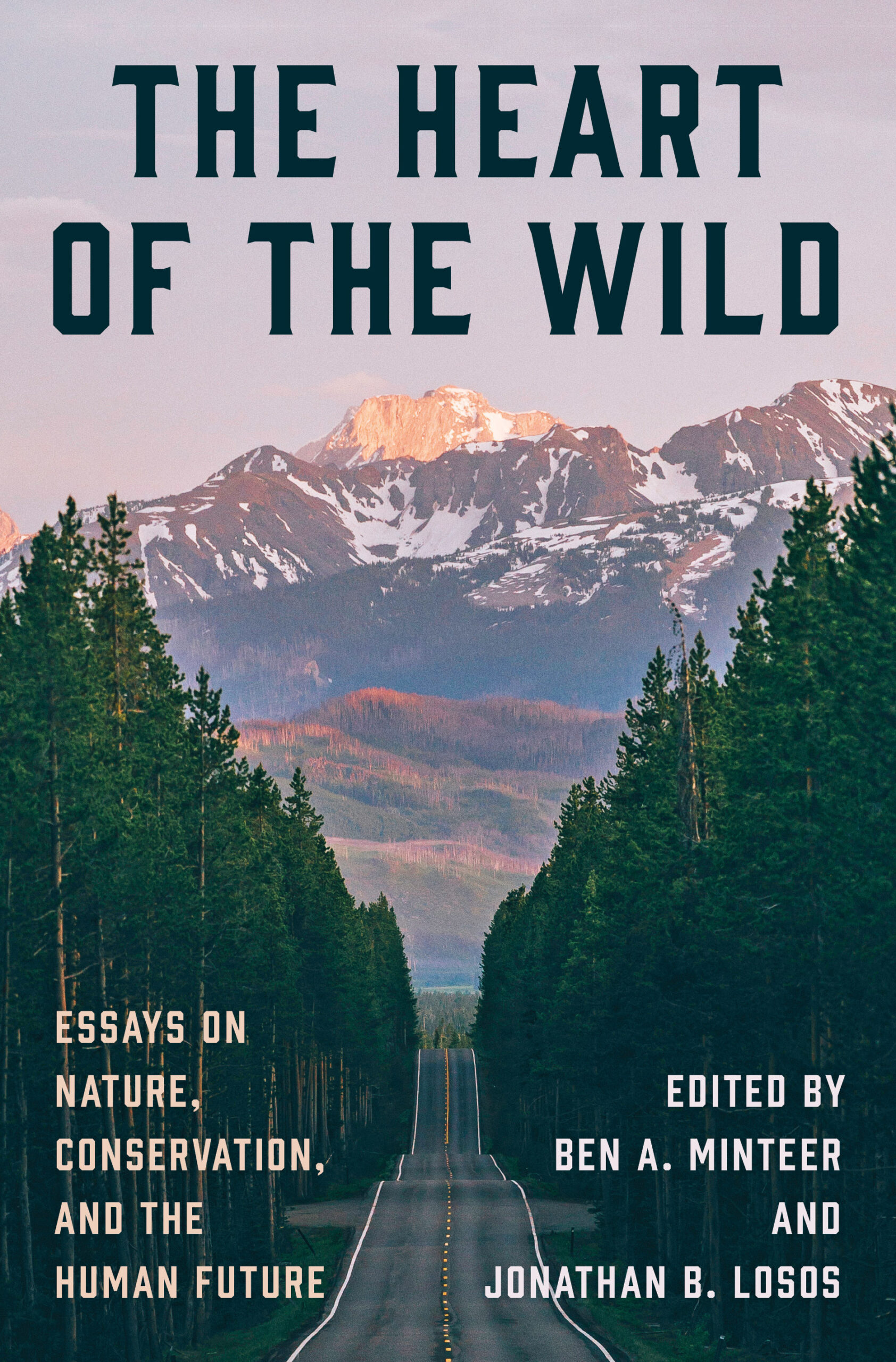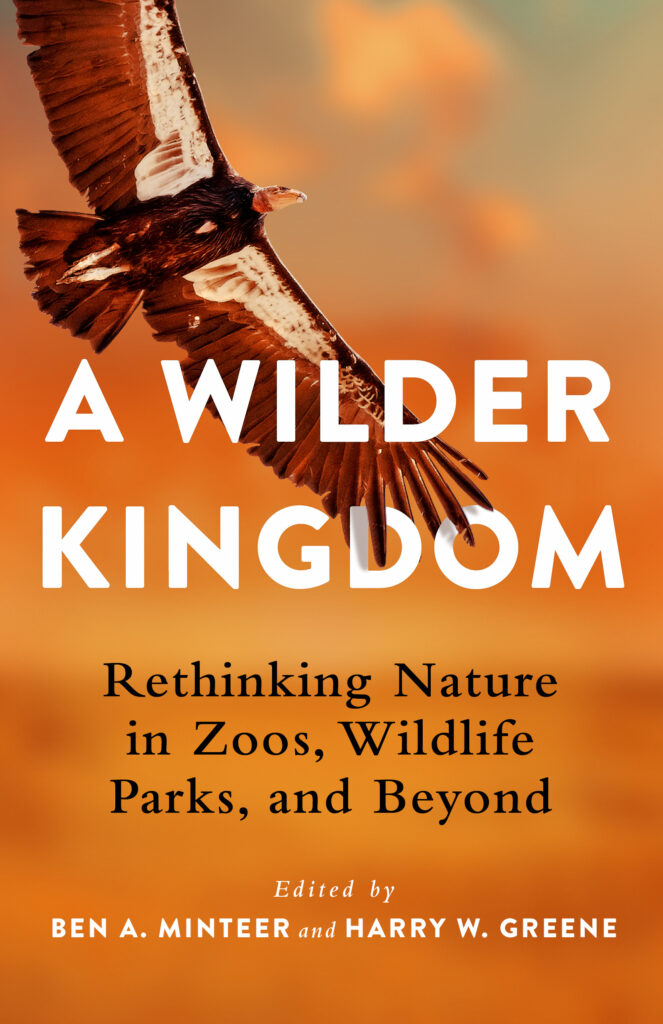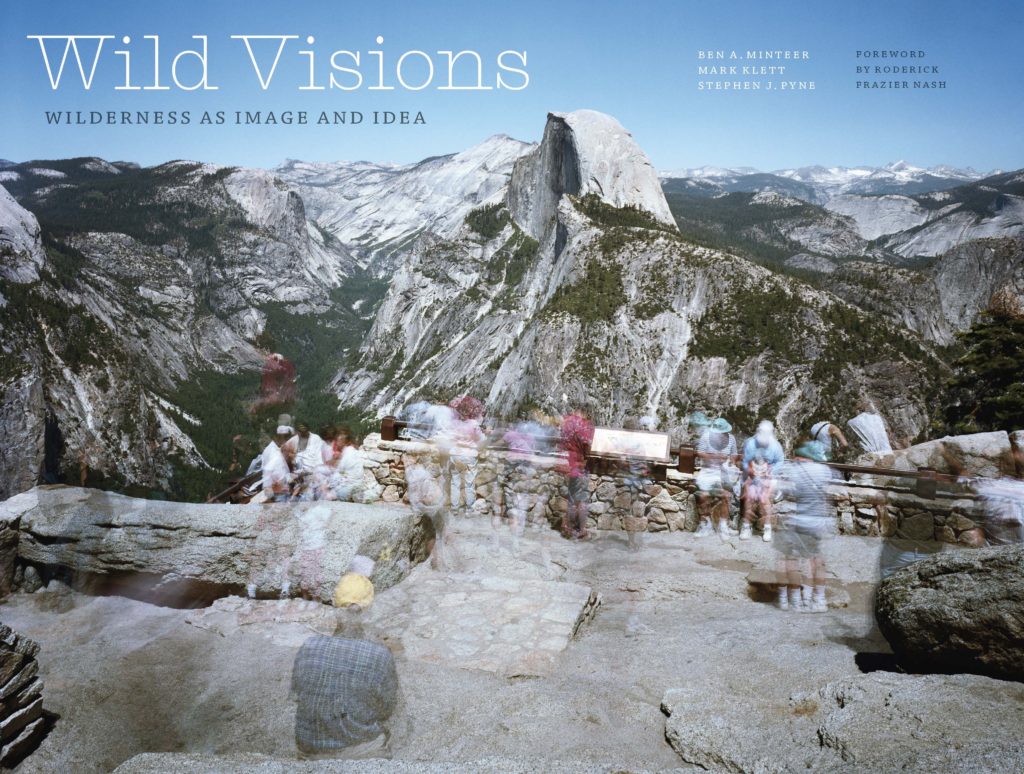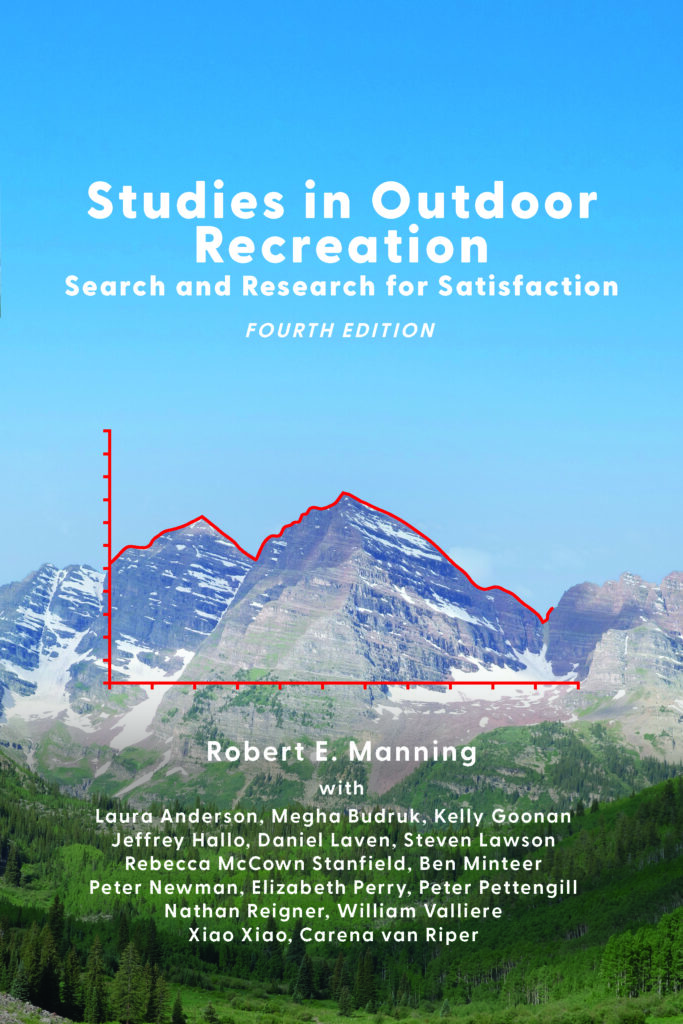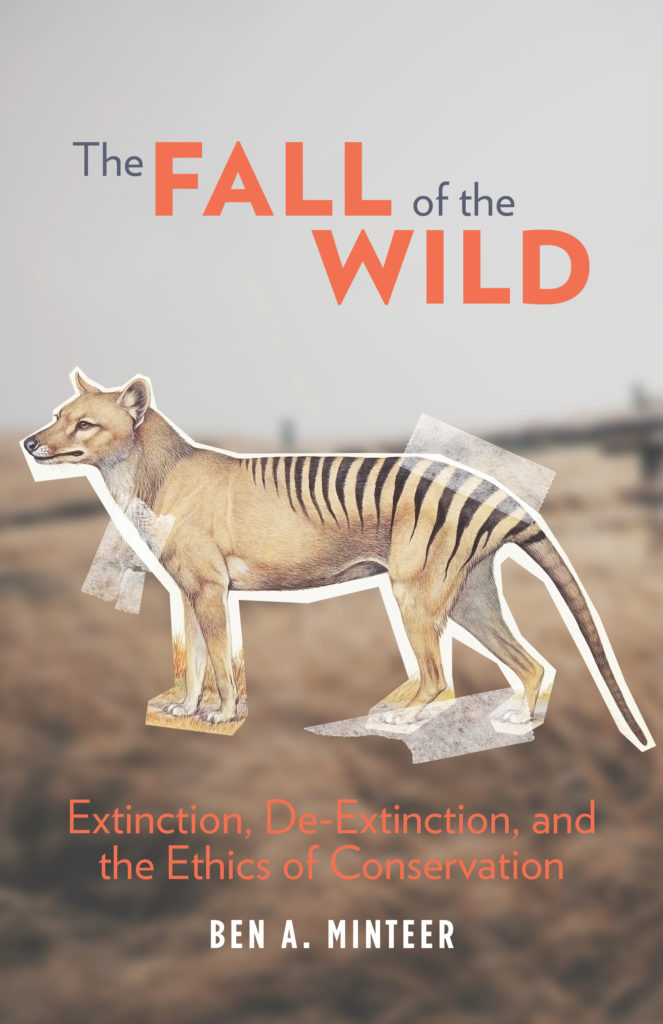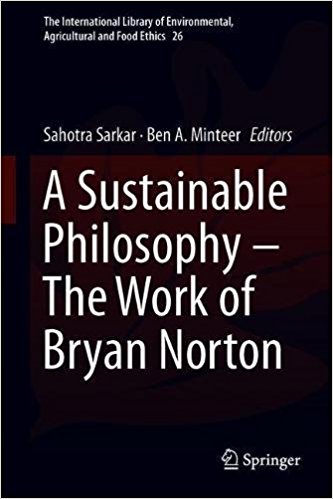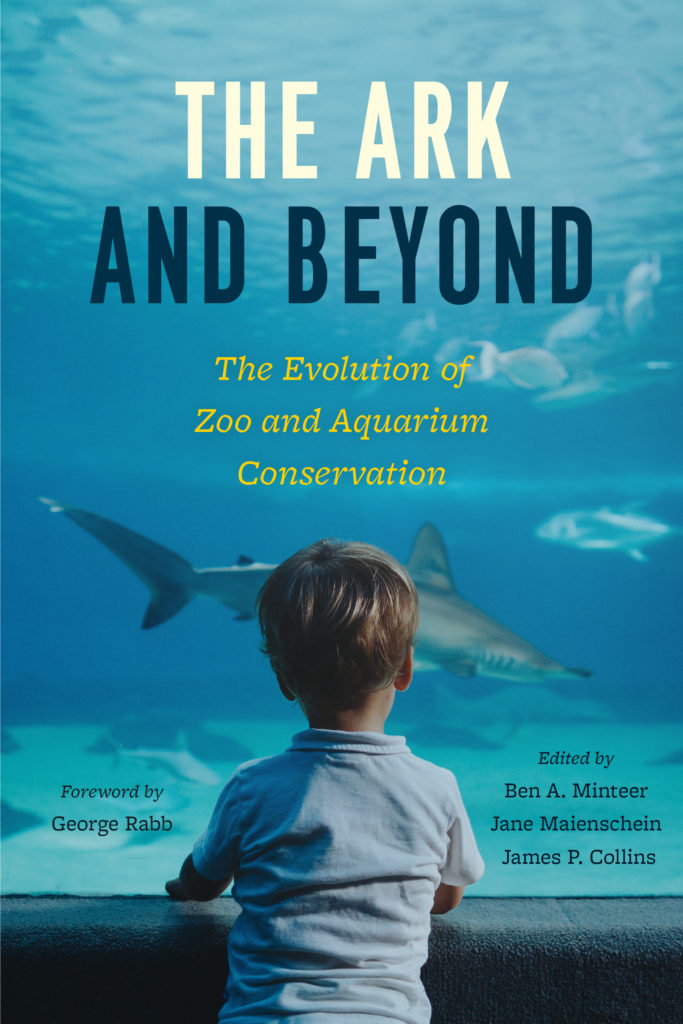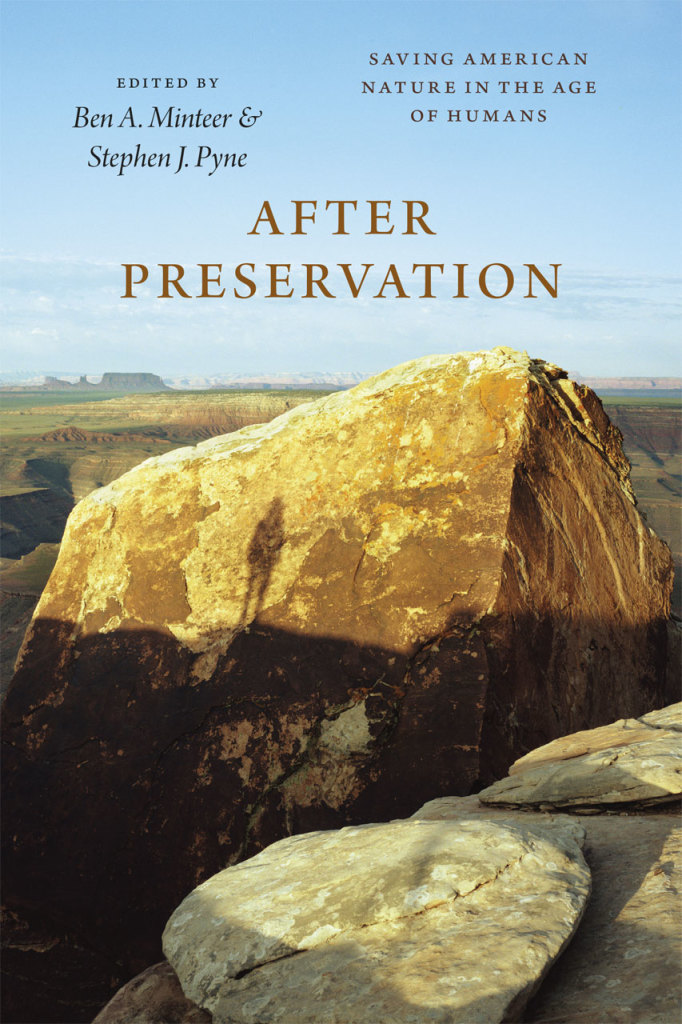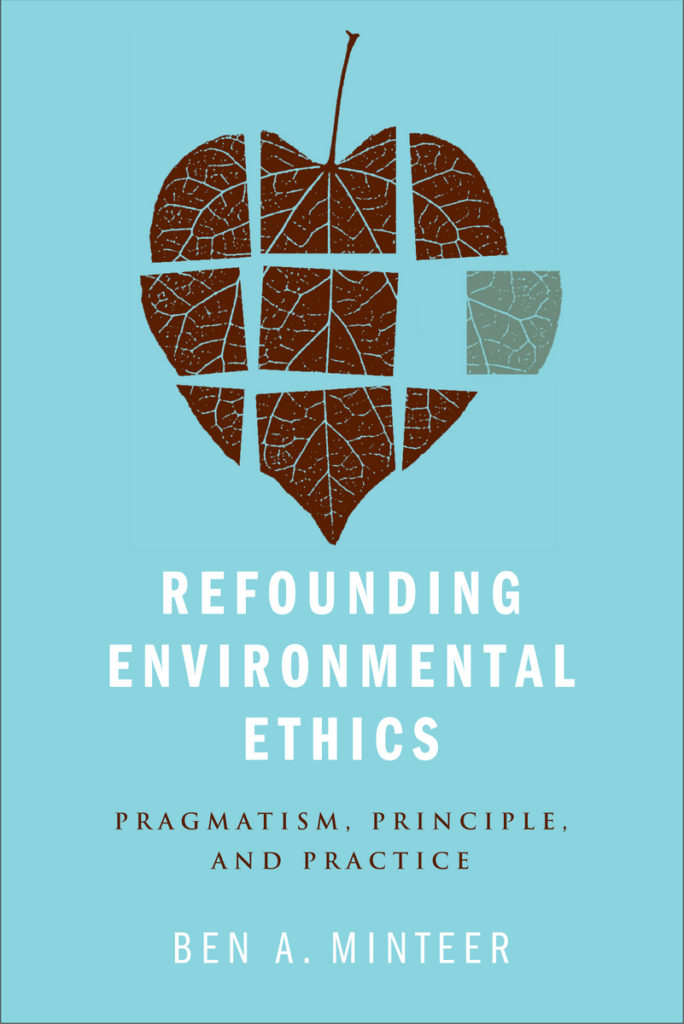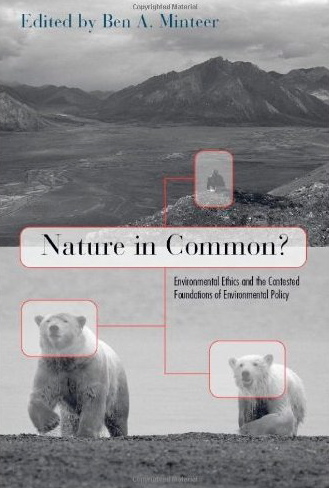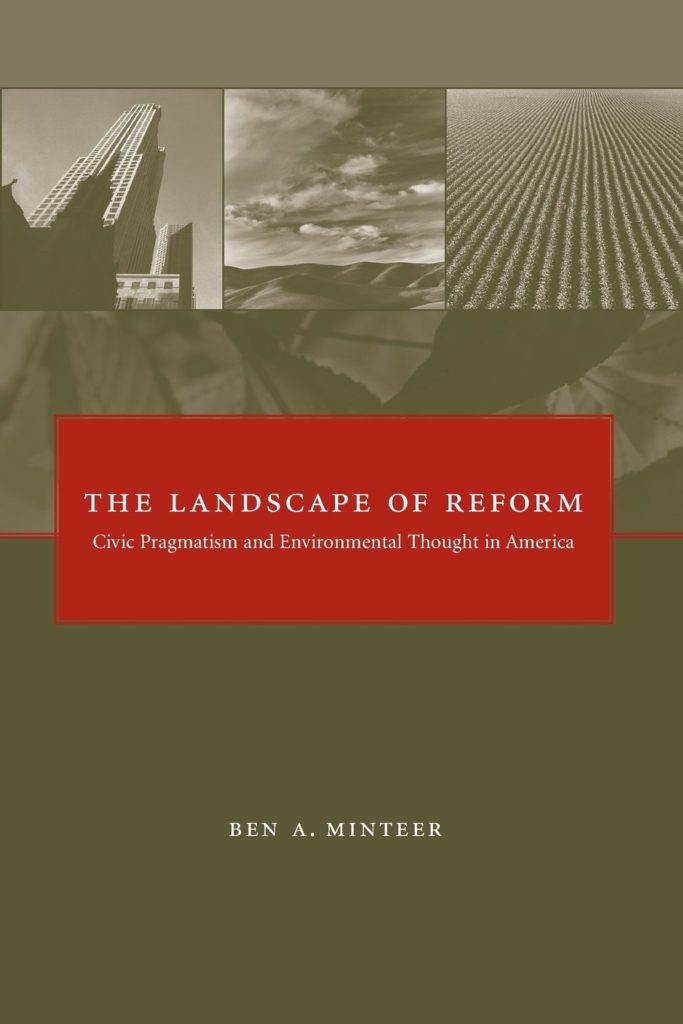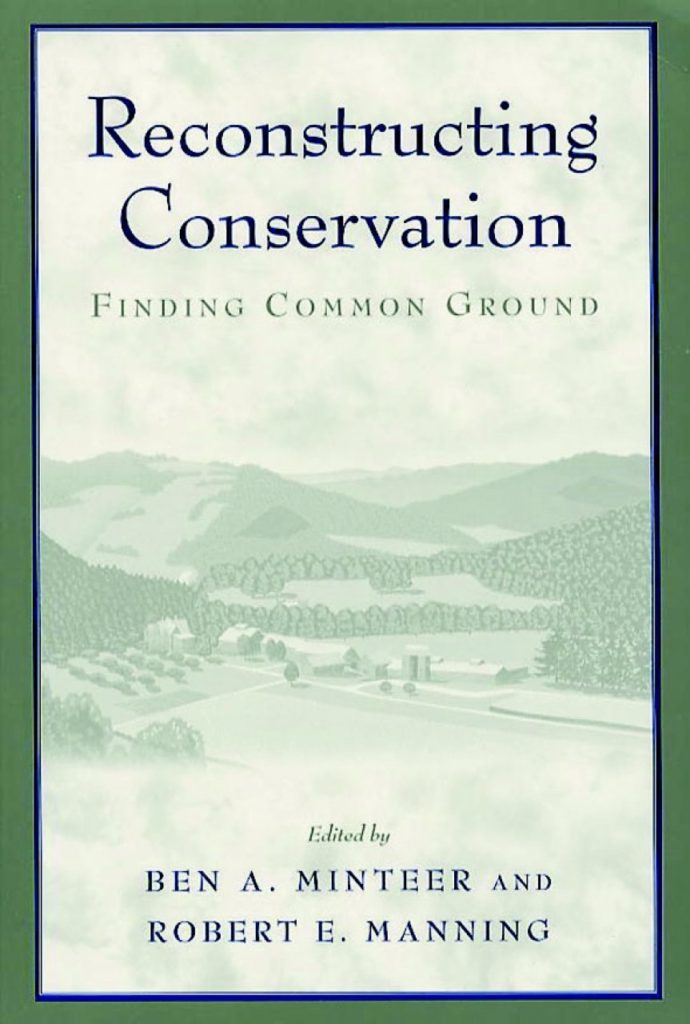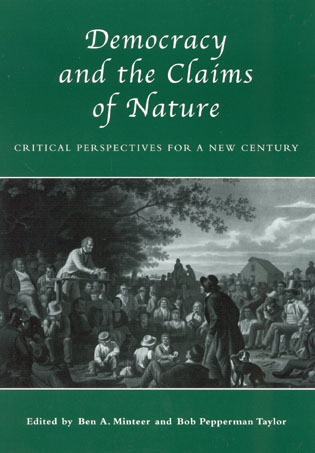The Heart of the Wild brings together some of today’s leading scientists, humanists, and nature writers to offer a thought-provoking meditation on the urgency of learning about and experiencing our wild places in an age of rapidly expanding human impacts.
These engaging essays present nuanced and often surprising perspectives on the meaning and value of “wildness” amid the realities of the Anthropocene. They consider the trends and forces—from the cultural and conceptual to the ecological and technological—that are transforming our relationship with the natural world and sometimes seem only to be pulling us farther away from wild places and species with each passing day. The contributors make impassioned defenses of naturalism, natural history, and nature education in helping us to rediscover a love for the wild at a time when our connections with it have frayed or been lost altogether.
Charting a new path forward in an era of ecological uncertainty, The Heart of the Wild reframes our understanding of nature and our responsibility to learn from and sustain it as the human footprint sinks ever deeper into the landscapes around us.
With contributions by Bill Adams, Joel Berger, Susan Clayton, Eileen Crist, Martha L. Crump, Thomas Lowe Fleischner, Harry W. Greene, Hal Herzog, Jonathan B. Losos, Emma Marris, Ben A. Minteer, Kathleen Dean Moore, Gary Paul Nabhan, Peter H. Raven, Christopher J. Schell, Richard Shine, and Kyle Whyte.
Reviews
“The scientists, humanists, and nature writers whose essays grace this book present subtle, though sometimes striking, differences in defining the term wild. Their thought-provoking essays not only convey the complexities involved—the tensions among preservation, rewilding, and human access—but often surprise with their unconventional attitudes and perspectives. Yet each essayist seems to share a conviction that having a scientific grasp of the perils facing our planet is incomplete without forging a moral and emotional bond with it.”—Kirkus Reviews
“Falling in love with the world around us—a world from which we’re too often abstracted and distant—may be the first crucial step toward saving some of that creation. The essays in this book, from some of the wisest and most eloquent voices on the planet, should summon us to this vital work.”—Bill McKibben, editor of American Earth: Environmental Writing since Thoreau
“This richly reflective book alerts us that conserving nature’s diversity will take more than political will and conventional pieties. It will take some sharper thinking. We can’t honor or save the ‘heart’ of the ‘wild’ until we better understand, and agree more broadly upon, what those two words might mean.”—David Quammen, author of The Song of the Dodo and Breathless
“The Heart of the Wild is a wonderful collection—a rich conversation that challenges orthodoxies, makes unexpected connections, and reminds us of the value of even the humblest forms of life.”—Michelle Nijhuis, author of Beloved Beasts
“In the enduring words of Aldo Leopold, the ecologist lives alone in a world of wounds—but The Heart of the Wild makes for awfully good company. The eclectic essays in this collection probe and challenge conservation’s deepest-held beliefs, lament all our planet has lost, and outline provocative visions for a future in which nature persists, albeit in a much-changed form. By turns heartbreaking and inspiring, this book finds wildness in the Anthropocene’s rubble, and alleviates our loneliness along the way.”—Ben Goldfarb, author of Crossings and Eager
“This star-studded compendium of writing by some of the world’s leading thinkers and researchers belongs in every nature lover’s library. These essays will thrill and challenge and maybe even upset you—but there is no way you will come away from this book unmoved.”—Sy Montgomery, author of Of Time and Turtles: Mending the World, Shell by Shattered Shell
Zoos have always had a troubled relationship to what is considered the “real” wild. Even the most immersive and naturalistic zoos, critics maintain, are inherently contrived and inauthentic environments. Zoo animals’ diet, care, and reproduction are under pervasive human control, with natural phenomena like disease and death kept mostly hidden from public view. Furthermore, despite their growing commitment to conservation and education, zoos are entertainment providers that respond to visitors’ expectations and preferences. What would a “wilder” zoo―one that shows the public a wider range of ecological processes―look like? Is it achievable or even desirable? What roles can or should zoos play in encouraging humanity to find meaningful connections with wild animals and places?
A Wilder Kingdom is a provocative and reflective examination of the relationship between zoos and the wild. It gathers a premier set of multidisciplinary voices―from animal studies and psychology to evolutionary biology and environmental journalism―to consider the possibilities and challenges of making zoos wilder. In so doing, the contributors offer new insights into the future of the wild beyond zoos and our relationship to wild species and places across the landscape in an increasingly human-dominated era.
Reviews
“What are zoos for, and what should they be like? In the Anthropocene era, long-held distinctions between human and natural, managed and wild are blurring. A Wilder Kingdom asks how zoos might be re-imagined to represent and support wild nature. This delightful and diverse book offers thoughtful and challenging ideas for the future of zoos in an increasingly human-dominated natural world.” —Bill Adams, Claudio Segré Professor of Conservation and Development, Geneva Graduate Institute
“A Wilder Kingdom is a thought-provoking, informative, and enjoyable read. The well-crafted essays, written by authors with a wide range of perspectives, backgrounds, and expertise, will appeal to anyone interested in nature, animal welfare, zoos, wild landscapes, and the human interactions with all of these.” —Marty Crump, coauthor of Women in Field Biology: A Journey into Nature
“This remarkable collection of essays addresses the shifting and conflicted missions of zoos in the modern world. The central theme of the chapters is the possibility of enhancing the experience of wildness for zoo animals and visitors. Along the way, the authors address a host of fascinating questions. For example, what would a wilder zoo look like? Is a baby rhino who was conceived via in vitro fertilization a wild animal? Can zoos prepare animals for life in the wild? This book changed the way I think about zoos, and I suspect it will pave the way for the zoos of the future.” —Hal Herzog, author of Some We Love, Some We Hate, Some We Eat: Why It’s So Hard To Think Straight About Animals
Foreword by Roderick Frazier Nash
Our ideas of wilderness have evolved dramatically over the past one hundred and fifty years, from a view of wild country as an inviolable “place apart” to one that exists only within the matrix of human activity. This shift in understanding has provoked complicated questions about the importance of the wild in American environmentalism, as well as new aesthetic expectations as we reframe the wilderness as (to some degree) a human creation.
Wild Visions is distinctive in its union of landscape photography and environmental thought, a merging of short, thematic essays with a striking visual narrative. Often, the wild is viewed in binary terms: either revered as sacred and ecologically pure or dismissed as spoiled by human activities. This book portrays wilderness instead as an evolving gamut of understandings, a collage of views and ideas that is still in process.
Reviews
“A thought‑provoking and informative exploration of the idea of wilderness in the U.S. It is a pleasure to see so much smart photography, across multiple generations of production, gathered in one volume.”—Rebecca A.Senf, author of Making a Photographer: The Early Works of Ansel Adams
“Wild Visions provides a sweeping yet succinct visual depiction of ‘the wild,’ and lays out a critical context for understanding the evolution of cultural meanings in that imagery.”—Curt Meine, author of Aldo Leopold: His Life and Work
“Wild Visions” is not simply a compilation of landscape photographs, but an argument for the power of imagery to enhance our evolving understanding of wilderness and its preservation, something peculiar to the identity and values of Americans.”—Laura McPhee, author and photographer, River of No Return
“A welcome and thought‑provoking reappraisal of the meaning of protecting “wilderness” in American history and culture, pleasingly illustrated with nearly two centuries of photographs and writings.”—John Leshy, author of Our Common Ground: A History of America’s Public Lands
“In essays, dialogues, and photographs, this eloquent book circles through historically shifting definitions of the word ‘wilderness.’ The authors draw on their lives in the American West and decades of analysis to challenge our perceptions.”—Anne Wilkes Tucker, author of The Woman’s Eye
The first book to review the social science literature on outdoor recreation, Studies in Outdoor Recreation (4th ed.) examines studies from this broad, interdisciplinary field, integrates them into coherent chapters on relevant issues and topics, and synthesizes research findings into a body of knowledge. The final chapter presents a series of principles designed to guide park and outdoor recreation research and inform park and wilderness management. The book includes an extensive bibliography of 2,000 references and a guide to the social science literature that leads readers to primary source materials.
This fourth edition is fully updated and revised to reflect current research and new issues in the field, such as the evolving meaning of parks and wilderness, new models of parks, sustainable transportation in outdoor recreation, equitable access to outdoor recreation opportunities, the role of outdoor recreation in physical and mental wellbeing, the effects of climate change on outdoor recreation use and management, and theoretical and empirical issues in outdoor recreation research. [Bob Manning is lead author; I’m one of 15 co-authors for this new edition.]
The passenger pigeon, the great auk, the Tasmanian tiger—the memory of these vanished species haunts the fight against extinction. Seeking to save other creatures from their fate in an age of accelerating biodiversity loss, wildlife advocates have become captivated by a narrative of heroic conservation efforts. A range of technological and policy strategies, from the traditional, such as regulations and refuges, to the novel—the scientific wizardry of genetic engineering and synthetic biology—seemingly promise solutions to the extinction crisis.
The Fall of the Wild calls for reflection on the ethical dilemmas of species loss and recovery in an increasingly human-driven world. It asks an unsettling but necessary question: Might our well-meaning efforts to save and restore wildlife pose a threat to the ideal of preserving a world that isn’t completely under the human thumb? The book probes the tension between our impulse to do whatever it takes and the risk of pursuing strategies that undermine our broader commitment to the preservation of wildness. From collecting wildlife specimens for museums and the wilderness aspirations of zoos to visions of “assisted colonization” of new habitats and high-tech attempts to revive long-extinct species, the book explores the scientific and ethical concerns vexing conservation today. The Fall of the Wild is a nuanced treatment of the deeper moral issues underpinning the quest to save species on the brink of extinction and an accessible intervention in debates over the principles and practice of nature conservation.
*See the “Page 99 Test” for the book: http://page99test.blogspot.com/2018/12/ben-minteers-fall-of-wild.html
Reviews
“[A] wise and subtle book on the ethics of modern wildlife conservation…” –Wall Street Journal
“What to do — and not to do — about the biodiversity crisis that we ourselves are engineering? in The Fall of the Wild, Ben Minteer takes us through the options. His assessment of the situation is balanced, clear-sighted, and humane.” -Elizabeth Kolbert, author of The Sixth Extinction: An Unnatural History
“In a kind of writing that has become rare today because of its mix of honesty, eloquence and compassion, Ben Minteer has done us all a favor by giving us a clear-headed, full-hearted perspective on where the conservation movement can and should move in the future. In doing so, he joins the ranks of other great thinkers who changed the course of conservation history during their all-too-brief sojourns into Arizona’s deserts and mountains, from Aldo Leopold and Joseph Wood Krutch to Ed Abbey and Paul Martin. Minteer bravely takes on the many facile assumptions of conservation’s technofixologists and misanthropes alike to offer us a humbler and hopefully more effective way to save and to savor the presence of the remaining living riches of the ‘natural’ world.”-Gary Paul Nabhan, author of Food from the Radical Center: Healing our Lands and Communities, and co-editor, Stitching the West Back Together
“The central ethical question addressed by Minteer is not only how far might we go to prevent biological extinction, but how far should we go? He comes to this conundrum as a distinguished environmental philosopher with a broad and deep record of thoughtful scholarship, as well as the heart of someone who obviously cares about the future of nature. And most importantly, at a time when answering the question is ever more urgent, he plots a carefully explicated, cautiously hopeful course forward.”-Harry W. Greene, author of Tracks and Shadows: Field Biology as Art
“In this pithy set of essays Ben Minteer tackles some of the thorniest questions we face as caring citizens and dwellers on the Earth. As human environmental impacts accelerate and our technological capacities expand, we face complex decisions involving where and when and how to intervene in ecosystems in the name of conservation. With clarity and circumspection Minteer examines our assumptions about wildness, our human capacity to live with it (or without it), and the far-reaching ethical implications of our choices.” -Curt Meine, author of Aldo Leopold: His Life and Work
“Eminently readable essays on a variety of conservation approaches.” -Choice
“Ben Minteer’s latest book is an important contribution to environmental ethics, conservation biology and related disciplines. It is especially valuable since his inquiry into various strategies in conservation takes place in the new epoch of the geology of mankind, where humans have become a geologic force comparable in power and universality to other great forces of earth…The Fall of the Wild is a thoughtful, carefully reasoned, and timely book.” – Biological Conservation
A Sustainable Philosophy offers a richly interdisciplinary assessment of the thought and work of Bryan Norton, one of most innovative and influential environmental philosophers of the past thirty years. In landmark works such as Toward Unity Among Environmentalists and Sustainability: A Philosophy of Adaptive Ecosystem Management, Norton charted a new and highly productive course for an applied environmental philosophy, one fully engaged with the natural and social sciences as well as the management professions. A Sustainable Philosophy gathers together a distinguished group of scholars and professionals from a wide array of fields (including environmental philosophy, natural resource management, environmental economics, law, and public policy) to engage Norton’s work and its legacy for our shared environmental future. A study in the power of intellectual legacy and the real-world influence of philosophy, the book will be of great interest scholars and students in environmental philosophy, public policy and management, and environmental and sustainability studies. By considering the value and impact of Norton’s body of work it will also chart a course for the next generation of pragmatic environmental philosophers and sustainability scholars grappling with questions of environmental value, knowledge, and practice in a rapidly changing world.
Review
“A Sustainable Philosophy can be read much like the trajectory of Norton’s work from Toward Unity Among Environmentalists to Sustainable Values, Sustainable Change, as an investigation of the conditions under which plural values do converge through procedure inclusive of difference but committed to concerted action…[It] brings into dialogue diverse perspectives on how better democratic deliberation can and does produce sustainable environmental management.”
—Environmental Values
Scores of wild species and ecosystems around the world face a variety of human-caused threats, from habitat destruction and fragmentation to rapid climate change. But there is hope, and it, too, comes in a most human form: zoos and aquariums. Gathering a diverse, multi-institutional collection of leading zoo and aquarium scientists as well as historians, philosophers, biologists, and social scientists, The Ark and Beyond traces the history and underscores the present role of these organizations as essential conservation actors. It also offers a framework for their future course, reaffirming that if zoos and aquariums make biodiversity conservation a top priority, these institutions can play a vital role in tackling conservation challenges of global magnitude.
Reviews
“Essential.” —Choice (Choice Outstanding Academic Title, 2018)
“In an age of extinction, ‘wild’ places are increasingly being managed like zoos. What role do actual zoos and aquariums have to play? The Ark and Beyond looks at this question from all angles; the result is both informative and thought-provoking.
—Elizabeth Kolbert, author of the Pulitzer Prize–winning The Sixth Extinction: An Unnatural History
“The role of zoos and aquariums is constantly evolving, particularly as there is pressure to increase their contribution to conservation. This collection ably shows that zoos and aquariums are not a flotilla of little arks that have to be self-sufficient. Rather, we should be better grounded in the social fabric of our communities, better networked, and better connected to the animals outside our walls.”
—Jenny Gray, CEO of Zoos Victoria, Australia, and president of the World Association of Zoos and Aquariums
“The Ark and Beyond is essential reading for anyone interested in our tangled and evolving relationship with zoos and aquariums. At the zoo we find ourselves at the shifting borderland between the wild and the walled. This book’s editors and contributors explore that territory, bringing together decades of practical and theoretical expertise in conservation biology, history, and education. Their insights will deeply inform and benefit readers wrestling with the complex questions we find ourselves asking when we lock eyes with our kindred creatures.”
—Curt Meine, Aldo Leopold Foundation & Center for Humans and Nature
“A valuable contribution to existing literature, not only by illustrating the earliest roots of contemporary conservation strategies that, although substantially distinct from ex situ conservation in the twenty-first century, nonetheless reveals deep roots to a phenomenon that is often considered to be very recent indeed. Featuring contributions from a broad array of international scholars and ranging across time and space, the collection represents a thorough articulation of the fluid histories, challenges, and futures of zoo- and aquarium-based conservation. . . . Engaging, accurate, and concise, the collection succeeds in communicating stories of complex pasts, presents, and futures in accessible form and to multiple audiences. Indeed, this work has much to say to historians, bioscientists, geographers, zoologists, and zoo management alike.” —Environmental History
“A remarkably thorough account of zoo and aquarium conservation. . . . Highly balanced. . . . Anyone who has visited a zoo or aquarium, and wondered whether its educational and conservation benefits outweigh its costs in terms of potentially diminished animal well-being, will find this book captivating.” —Journal of the History of Biology
From John Muir to David Brower, from the creation of Yellowstone National Park to the Endangered Species Act, environmentalism in America has always had close to its core a preservationist ideal. Generations have been inspired by its ethos—to encircle nature with our protection, to keep it apart, pristine, walled against the march of human development. But we have to face the facts. Accelerating climate change, rapid urbanization, agricultural and industrial devastation, metastasizing fire regimes, and other quickening anthropogenic forces all attest to the same truth: the earth is now spinning through the age of humans. After Preservation takes stock of the ways we have tried to both preserve and exploit nature to ask a direct but profound question: what is the role of preservationism in an era of seemingly unstoppable human development, in what some have called the “Anthropocene”? The volume brings together a stunning consortium of voices comprised of renowned scientists, historians, philosophers, environmental writers, activists, policy makers, and land managers to negotiate the incredible challenges that environmentalism faces.
Reviews
“Conservation requires conversation; protecting nature while still using it to meet human needs is a paradoxical mission, and its methods depend heavily on time and place. In such terrain, manifestos make lousy guides. Better is a forum such as After Preservation, which not only seats ecomodernists, wilderness purists, bureaucrats, and scientists at the same long, noisy table but also places their positions in historical context.” —New Yorker
“Although environmentalists have traditionally held onto a preservationist philosophy in fending off ecological harms, the omnipresence of human influence makes many now wonder if that approach is still feasible. In this collection of twenty-three spirited and thought-provoking essays, scientists, historians, and activists alike represent a broad spectrum of viewpoints, from conservation at all costs to balancing the natural world’s needs with those of civilization. . . . Everyone concerned with the ongoing debate over wildlife protection will want to study this vitally important contribution to the discussion.” —Booklist
“Whether you like the label ‘Anthropocene’ or not, whether you find the prospect of what it signifies inevitable or appalling (or both), the time has come to address its implications, as these thoughtful, battle-tested authors attempt to do. The time has long since come.” —David Quammen, author of Spillover.
Combining environmental ethics, democratic theory, philosophical pragmatism, and the environmental social sciences, Refounding Environmental Ethics makes the case for a more experimental, interdisciplinary, and democratic style of environmental ethics—one that stands as an alternative to the field’s historically dominant “nature-centered” outlook. In doing so it also demonstrates the relevance of pragmatic environmental ethics for environmental problem solving and conservation practice.
Reviews
“The best articulation and defense of environmental pragmatism to date…What gives this book particular relevance is Minteer’s articulation of how environmental pragmatism can be applied to twenty-first-century environmental issues…Richard Rorty once wrote, “Truth is what your contemporaries let you get away with”…Minteer, in this important work, refuses to let environmental philosophers get away with policy irrelevance.”—BioScience
“…should be required reading for all those still laboring under the misapprehension that the pragmatist tradition lacks internal depth, distinctions, and subtlety…a well-crafted book that outlines a deeply sympathetic, engaged variant of pragmatic environmental ethics…”—Environmental Ethics
“[A] provocative and important book on the current state of affairs in environmental ethics. It is provocative because his version of pragmatism is advocated in a novel and strategic fashion. It is important because he strongly makes the case that if environmental ethics is to survive as something more than an esoteric subdiscipline of an esoteric profession—that is, if it is to make a genuine difference for non-philosophers and non-humans, alike—then it must adjust to the current situation, which, to be blunt, is dire….In his considerate book, Minteer exemplifies this democratic hope with nuance and intelligence—for which we all, humans and non-humans, should be grateful.”—Ethics, Policy & Environment
“Minteer’s new book lives up to its title…[Minteer] builds his search for environmental values on a firm foundation in social science, which is essential to his pragmatist approach. He builds on Dewey’s conception of democracy to deepen and broaden the intellectual base for environmental pragmatism, supporting a pluralistic way to determine and pursue environmental values, and he intertwines his argument with case studies and real situations. [This] book will be especially useful for environmental ethics classes designed for environmental studies or environmental policy students.”—Bryan G. Norton, Distinguished Professor, School of Public Policy, Georgia Institute of Technology
“Minteer’s new book provides a comprehensive description and defense of policy-oriented environmental pragmatism. He shows how some of the most common arguments against pragmatism simply misunderstand and distort what pragmatists are saying, but he also makes substantive methodological and epistemological claims that will provoke creative responses from people who are sympathetic to a pragmatist position. At the same time, his closing chapter on environmental philosophy in an era of climate adaptation presents entirely novel reasons for rethinking traditional ecocentric commitments to intrinsic values. All in all, Refounding Environmental Ethics is a wonderful package—everything one could hope for in a book on environmental philosophy!“ —Paul B. Thompson, W. K. Kellogg Professor of Agricultural, Food, and Community Ethics, Michigan State University
Should we appreciate nature mainly for its ability to advance our interests or should we respect it as having a good of its own, apart from any contribution to human well being? The fourteen essays in this edited collection discuss the “convergence hypothesis” put forth by Bryan Norton—a controversial thesis in environmental ethics about the policy implications of moral arguments for environmental protection. Historically influential essays are joined with newly commissioned essays to provide the first sustained attempt to reconcile two long-opposed positions. Norton himself offers the book’s closing essay.
Reviews
“Nature in Common? brings together leading environmental philosophers to sharpen and clarify the divisions and critically examine the strengths and limits of moving environmentalists toward an agenda with which most can agree. This is an important and unique collection of essays [and] deserves to be read widely.” —Jan Dizard, Charles Hamilton Houston Professor of American Culture and the Pick Professor of Environmental Studies, Amherst College
“Nature in Common? is a pivotal contribution to the field of environmental ethics as it grapples with the means and modes of making more significant impacts on local, national, or international environmental policy and decision making. For anyone interested in the subject, Minteer provides a balanced and well organized selection of the most influential thinkers who have long been hashing out the terms of debate for environmental ethics since the 1970s. This book is a necessary read for students in environmental ethics and policy.” —The Journal of Agricultural and Environmental Ethics
“Ben Minteer has done the environmental community a great service by bringing together an excellent collection of essays…. Besides being a valuable resource for established environmental ethicists, the volume would contribute nicely to advanced undergraduate or graduate courses, especially if they include policy-oriented students…. We can thank Minteer for putting together an excellent anthology…that may ultimately contribute to greater convergence among environmentalists around the cogency of the convergence hypothesis.” —Environmental Ethics
A fresh and provocative reading of the intellectual foundations of American environmentalism, focusing on the work and legacy of four important conservation and planning thinkers in the first half of the twentieth century: Liberty Hyde Bailey, a forgotten figure in the Progressive conservation movement; urban and regional planning theorist Lewis Mumford; Benton MacKaye, the forester and conservationist who proposed the Appalachian Trail in the 1920s; and Aldo Leopold, author of the environmentalist classic A Sand County Almanac. These writers blazed a significant “third way” in environmental ethics and practice, a more pragmatic approach that offers a counterpoint to the anthropocentrism-versus-ecocentrism—use-versus-preservation—narrative that has long dominated discussions of the development of American environmental thought. By rediscovering the pragmatic roots of American environmentalism, the book argues that we can help bring about a new, civic-minded environmentalism today.
Reviews
“This is an elegantly written, deeply researched book. Its delicate integration of intellectual history offers a valuable lesson for environmental historians…In the end, Minteer’s book raises important and provocative questions and, in turn, raises the level of our debate.” —The American Historical Review
“While environmental historians have long recognized connections between environmental thought and American political culture, and while a few environmental philosophers have recently begun to formulate a pragmatist environmental ethics, Minteer is the first to argue that American environmental thought is deeply rooted in the civic pragmatist tradition…The Landscape of Reform is clearly an important and well-written contribution to the history of environmental thought and politics. Those who take seriously William Cronon’s sage admonition to focus our attention on issues of sustainable use will find Minteer’s careful interdisciplinary scholarship particularly valuable.” —Environmental History
“…A rare book, a work that is both a detailed intellectual history of a nearly forgotten pragmatic tradition that once existed within American environmental circles, as well as a thoughtful plea for the modern American environmental movement to deemphasize the most radical aspects of its ideology …The Landscape of Reform should be recognized as a distinguished and significant piece of historical scholarship. Minteer deserves high praise for offering a revisionist corrective to the dominant historical narrative, which has tended to divide American environmentalism simplistically into either anthropocentric or ecocentric traditions.” —Environmental Practice
Reconstructing Conservation brings together 23 leading scholars and practitioners — including J. Baird Callicott, Susan Flader, Richard Judd, Curt Meine, Bryan Norton, and Paul B. Thompson — to examine the classical conservation tradition and its value to contemporary environmentalism. Focusing not just on the tensions that have marked the deconstructivist debate over wilderness and environmentalism, the book represents a larger and ultimately more constructive and hopeful discussion over the proper course of future conservation scholarship and action.
Reviews
“Most biologists are little aware of the rejuvenating but often acrimonious debates waged among academics from the fields of environmental history and philosophy. Those debates are central to Reconstructing Conservation: Finding Common Ground, a beautifully written book that attempts to build bridges between the scholarly practitioner and the conservation community…It represents a vital contribution to conservation scholarship.”—BioScience
“Minteer and Manning provide an excellent text. It is broad in scope, offering not just theoretical, but empirical research and ideas for a pragmatic ‘reconstruction’ of conservation policy. Indeed, reading the contents page alone is enough to send waves of panic through a Ph.D. student studying contemporary conservation policy...”—Environmental Politics
“Reconstructing Conservation does an admirable job of outlining a pluralistic and democratic philosophy of conservation that is grounded in history and science, a vision that can provide a strong foundation for conservation practice in the 21st century. Everyone working in conservation today should read this book.” —Environmental Conservation
This collection tackles the core questions raised by the intersection of our democratic and environmental commitments, including the conceptual and practical connections between democratic theory and environmental ethics, the potential for an environmentally defined democratic citizenship, the concerns of equity and justice in environmental discourse and policy making, and the shape and future of democratic environmental movements. The prominent contributors-philosophers, political theorists, and social scientists-engage both the complexities and the possibilities of a robustly democratic environmentalism, and each offers their own unique insights into the particular challenges that flow from the intermingling of environmental ethics and politics.
Reviews
“This collection will become the definitive text to consult to understand the interplay of democratic norms and environmental values. In this benchmark study, the leading philosophers in the field integrate past research and lay out the intellectual agenda for the future.” — Mark Sagoff, Institute of Philosophy and Public Policy, University of Maryland
“It is a testament to the innovation shown by the contributors that this volume exhibits such a high degree of originality. The book successfully traverses environmental ethics, democratic theory and environmental movements. It is a valuable contribution to an important area of green political theory.” — Political Studies Review
